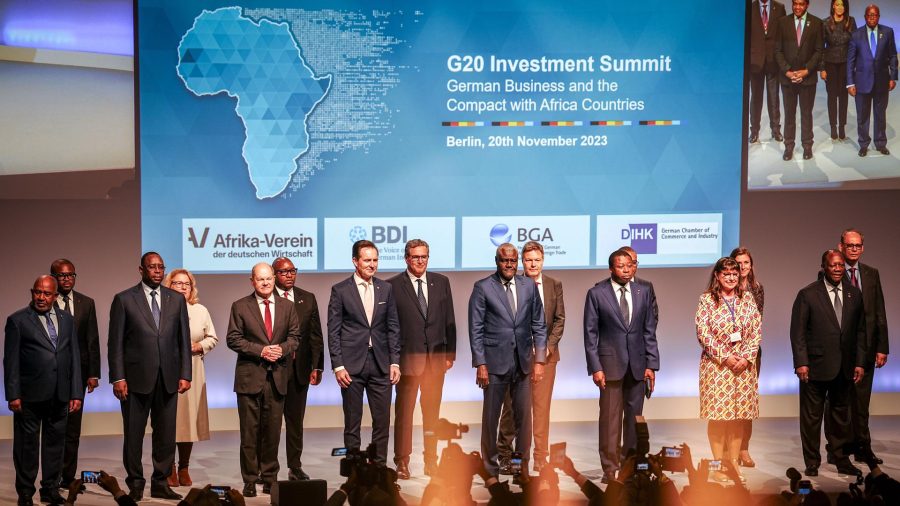Back
Compact with Africa: what has been achieved in six years?
7 December 2023

Analysis
Since its creation in 2017, led by Germany, has the CwA achieved its objective of generating more investment on the African continent? Does the initiative really take Africa's interests into account?
About
Carine Gazier is a project consultant at Concerto, specialising in political and economic issues and the energy sector in Africa. Contact Carine at cg@concerto-pr.com for more information on the subject, or to find out more about how Concerto can help you.QUICK INSIGHTS Held in Berlin on 20 November 2023, the 5th edition of Compact with Africa (CwA), a conference designed to promote investment in Africa, brought together 800 participants, and leaders from more than a dozen African countries. While the platform continues to increase its popularity on the continent, albeit rather slowly, it is not unanimously supported. Since its creation in 2017, led by Germany, has the CwA achieved its objective of generating more investment on the African continent? Does the initiative really take Africa's interests into account?
- Six years on, the CwA is struggling to initiate the wave of investment promised to member states.
- Despite the initial ambition, the CwA's agenda is guided primarily by European needs rather than the interests of African populations.
- Investment in green hydrogen is at the heart of the CwA's objectives, but the challenge of building investor confidence remains.
- The CwA's record on investment in Africa is unconvincing.
Putting Europe's needs first
The CwA's approach is intended to be different from previous Western approaches, which were characterised by the introduction of demanding conditionalities, particularly in terms of policy reforms, in order to obtain access to funds. Under the compact, African governments identify the policy measures that they wish to make to stimulate investment. This approach has been adopted to avoid any accusations of paternalism and to compete more effectively with China, but also to create a platform for Europe-Africa collaboration in which Africans would have real decision-making power. While the CwA has positive spin-offs for the African continent, it is nonetheless a European political and economic tool for Europeans, particularly for Germans. Its creation in 2017 was largely motivated by the search for solutions to reduce immigration. Today, since the COVID-19 pandemic and the war in Ukraine, it has been driven by the need to diversify partners and energy suppliers.CwA and investment in Africa: a mixed picture
The CwA brings together 13 African countries and aims to improve economic conditions in member African countries in order to increase private foreign investment flows, particularly from G20 countries. Now in its sixth year, the initiative has attracted new African countries, including Angola, Kenya, Nigeria and Zambia, who attended the 2023 conference as guests. Previous editions of the CwA have seen the emergence of a number of initiatives, including in 2018 Germany's creation of a fund to provide loans and equity to European SMEs wishing to invest in Africa, as well as equity to African SMEs. This year, Germany once again opened the event, with the announcement by German Chancellor Olaf Scholz of a German investment of €4 billion in green projects between 2023 and 2030, as part of the EU-Africa green energy initiative. The European Union has announced that it will contribute €3.4 billion to the initiative in the form of grants. Today, the CwA looks more like a tool of Germany's economic diplomacy in Africa. After six years of existence, the question is what impact these initiatives are having on the continent, and whether they are more than just window dressing. UNCTAD's World Investment Report 2023 shows that over the past five years, FDI flows to Africa have remained relatively stable, rising from USD 40,358 million in 2017 to USD 44,929 million in 2023. While the African member countries of the CwA are showing relatively more positive figures, it is difficult to attribute this to the initiative. The same trend of stagnating investment can be seen in Germany, the driving force behind the CwA, with barely 1% of its total investment directed towards the African continent. While this situation is due to the external shocks in recent years, it is also linked to the lack of confidence and the reluctance of European investors, particularly German investors, to invest in Africa.What is next?
The majority of the investment pledges made at the conference focused on energy; in particular on green hydrogen, a resource that Germany will particularly need if it is to achieve its goal of zero net emissions by 2045. The European leader also concluded a pact on renewable energies and an agreement on gas exports with Nigeria, worth USD 500 million. The issues of industrialisation, job creation, education and infrastructure, essential though they are for the continent, seem to have taken a back seat. If it is to be more effective, the CWA will no doubt have to align its agenda more closely with the development strategies of its African member countries, in order to create better synergies that can benefit people more directly and quickly. Finally, the CwA still faces the major challenge of building investor confidence. The initiative will certainly need more time to prove its added value compared with other forums for collaboration between Africa and Europe. For example, at COP28, held in Dubai from 30 November to 12 December 2023, the United Arab Emirates announced the creation of Alterra, a private fund that aims to mobilise USD 250 billion by 2030 to support climate action in developing countries.